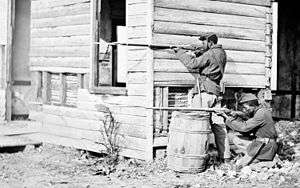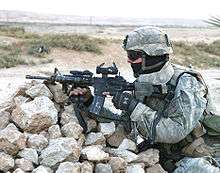Cover (military)
In military combat, cover is anything which is capable of physically protecting an individual from enemy fire. This differentiates it from the similar concept of concealment, in that an object or area of concealment only affords the benefit of stealth, not actual protection from small arms fire or artillery fragments. An example of "cover vs. concealment" would be sandbags vs. tall grass. Cover may be a naturally occurring feature, such as a rock or a tree stump, or it may be a constructed feature, such as a foxhole or a trench.


Uniform
In some military services (specifically in the United States), a uniform hat is generally referred to officially as a cover, as in "Hey Marine, remove your cover!" or "Sailor, you're not in uniform without your cover." It is a regulation in the United States Army, Air Force, Coast Guard, Marine Corps, and Navy that any armed Soldier, Airman, Coast Guardsman, Marine, or Sailor (respectively) must wear headgear while armed and indoors to indicate that they are under arms. In the Air Force on the Flight Line you are restricted from wearing covers to prevent them from causing Foreign Object Damage (FOD) unless it is a beanie or has a strap. Naval tradition indicates that a normal salute indoors can only be rendered if the person rendering the salute therein is either "Under Arms" and thus, wearing a cover, or is outdoors and never without a cover in any circumstance. Marines, Naval and Coast Guard personnel must never render a salute unless wearing a cover.
In gaming
Many first and third-person shooter video games encourage the player to use cover. This gameplay mechanic is often referred to as a "cover system".